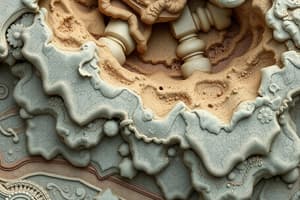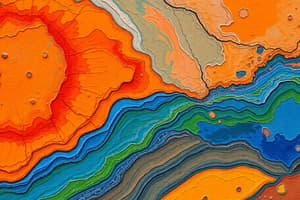Podcast
Questions and Answers
What is the difference between weathering and erosion?
What is the difference between weathering and erosion?
Weathering is when rocks are broken down (chemically or mechanically) and erosion is when sediment is carried away.
What is the difference between erosion and deposition?
What is the difference between erosion and deposition?
Deposition is when the sediment settles out of the water, wind, or ice that is carrying it.
What is sediment?
What is sediment?
The material moved by erosion.
Why are plants helpful in preventing the erosion of soil?
Why are plants helpful in preventing the erosion of soil?
What is erosion?
What is erosion?
Which natural force is the major agent of erosion on Earth's surface?
Which natural force is the major agent of erosion on Earth's surface?
What is the first step in the formation of soil?
What is the first step in the formation of soil?
What is soil made of?
What is soil made of?
What is the difference between loam and humus?
What is the difference between loam and humus?
What was the cause of the Dust Bowl?
What was the cause of the Dust Bowl?
What is drought?
What is drought?
What is the difference between mechanical weathering and chemical weathering?
What is the difference between mechanical weathering and chemical weathering?
What are 3 agents of mechanical weathering?
What are 3 agents of mechanical weathering?
What are 3 agents of chemical weathering?
What are 3 agents of chemical weathering?
What is the difference in the formation of a V-shaped valley and a U-shaped valley?
What is the difference in the formation of a V-shaped valley and a U-shaped valley?
What creates beaches?
What creates beaches?
How can waves cause erosion?
How can waves cause erosion?
Define glacier.
Define glacier.
Define the two types of glacial erosion.
Define the two types of glacial erosion.
What is a drainage basin?
What is a drainage basin?
What is oxidation?
What is oxidation?
How does oxidation chemically weather rock?
How does oxidation chemically weather rock?
What is a decomposer?
What is a decomposer?
Give examples of decomposers.
Give examples of decomposers.
What is a tributary?
What is a tributary?
Order the formation of a river.
Order the formation of a river.
What is mass movement?
What is mass movement?
Give examples of mass movement.
Give examples of mass movement.
What is permeable rock?
What is permeable rock?
Why will a permeable rock weather faster?
Why will a permeable rock weather faster?
In what type of climate will chemical weathering occur faster?
In what type of climate will chemical weathering occur faster?
Why does chemical weathering occur faster in hot, wet climates?
Why does chemical weathering occur faster in hot, wet climates?
Flashcards are hidden until you start studying
Study Notes
Weathering vs Erosion
- Weathering breaks down rocks through chemical or mechanical processes.
- Erosion involves the transportation of sediment by water, wind, ice, or gravity.
Erosion vs Deposition
- Deposition occurs when sediment settles out from the transporting medium.
Sediment
- Sediment refers to materials that have been moved by erosion.
Role of Plants in Soil Erosion
- Plants prevent soil erosion with their roots, which stabilize the soil.
Erosion Process
- Erosion is primarily caused by water, which is the leading agent in sediment transport.
Soil Formation
- Soil formation begins with weathering, resulting in broken rock that mixes with other earth materials.
Composition of Soil
- Soil consists of weathered rock and other organic materials.
Loam vs Humus
- Humus is organic material formed from decayed flora and fauna.
- Loam is a balanced mixture of sand, silt, and clay.
Dust Bowl Causes
- The Dust Bowl (1930s) was caused by prolonged drought and poor agricultural practices.
Drought Impact
- Over-plowing combined with drought conditions exposed topsoil, leading to erosion.
Mechanical vs Chemical Weathering
- Mechanical weathering involves physical breakdown of rocks; chemical weathering alters rock composition through chemical reactions.
Agents of Mechanical Weathering
- Key agents include abrasion, plant growth, and freeze-thaw cycles.
Agents of Chemical Weathering
- Main agents include water (most significant), oxygen, and carbon dioxide.
Valley Formation
- V-shaped valleys form via river activity; U-shaped valleys are shaped by glaciers.
Beach Formation
- Beaches are formed through sediment deposition by waves.
Erosion by Waves
- Waves erode land through impact and abrasion processes.
Glacier Definition
- Glaciers are large, slow-moving ice masses on land.
Types of Glacial Erosion
- Plucking occurs when glaciers lift rocks; abrasion results in scratches and gouges from rock dragging.
Drainage Basin
- A drainage basin is an area where a river and its tributaries collect water.
Oxidation Process
- Oxidation combines oxygen with iron in the presence of water, causing rocks to rust.
Effects of Oxidation
- Oxidation softens rocks, giving them a crumbly texture and reddish-brown color.
Decompostion Process
- Decomposers break down organic materials into smaller parts using chemical digestion.
Examples of Decomposers
- Common decomposers include fungi, bacteria, protists, and worms.
Tributary Definition
- A tributary is a stream that flows into a larger stream or river.
River Formation Sequence
- Rivers evolve from small rills to gullies, then streams, and finally into larger rivers.
Mass Movement
- Mass movement encompasses various processes that shift sediment downward.
Examples of Mass Movement
- Includes landslides, mudflows, creep, and slump events.
Permeable Rock
- Permeable rocks contain interconnected air pockets allowing water infiltration.
Weathering of Permeable Rock
- Permeable rocks weather faster due to water seeping through and leaching away dissolved materials.
Chemical Weathering in Different Climates
- Chemical weathering accelerates in hot and humid climates due to increased chemical reaction rates.
Studying That Suits You
Use AI to generate personalized quizzes and flashcards to suit your learning preferences.




